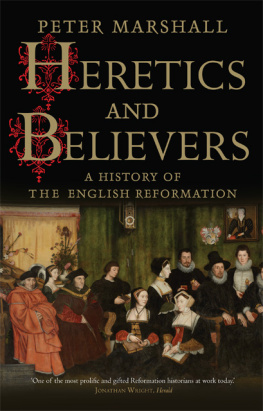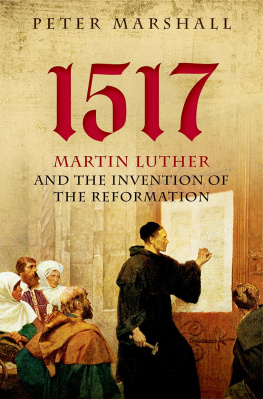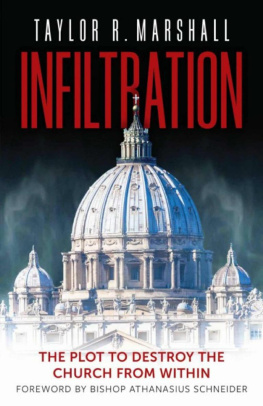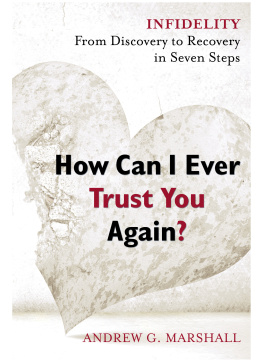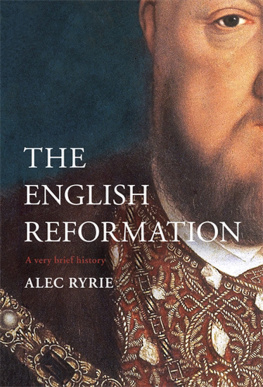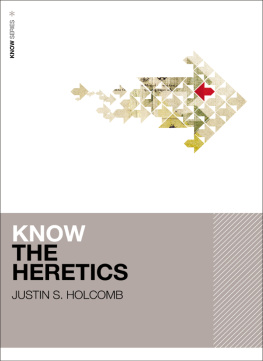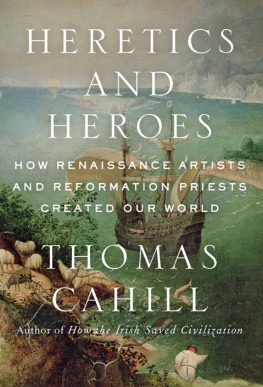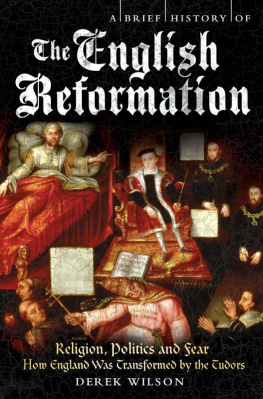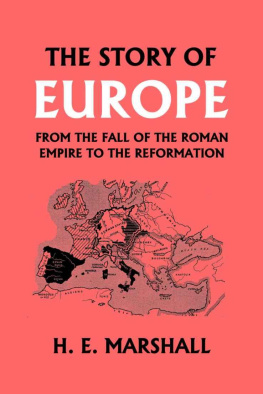Marshall - Heretics and Believers: a History of the English Reformation
Here you can read online Marshall - Heretics and Believers: a History of the English Reformation full text of the book (entire story) in english for free. Download pdf and epub, get meaning, cover and reviews about this ebook. City: England, year: 2018, publisher: Yale University Press, genre: Religion. Description of the work, (preface) as well as reviews are available. Best literature library LitArk.com created for fans of good reading and offers a wide selection of genres:
Romance novel
Science fiction
Adventure
Detective
Science
History
Home and family
Prose
Art
Politics
Computer
Non-fiction
Religion
Business
Children
Humor
Choose a favorite category and find really read worthwhile books. Enjoy immersion in the world of imagination, feel the emotions of the characters or learn something new for yourself, make an fascinating discovery.
Heretics and Believers: a History of the English Reformation: summary, description and annotation
We offer to read an annotation, description, summary or preface (depends on what the author of the book "Heretics and Believers: a History of the English Reformation" wrote himself). If you haven't found the necessary information about the book — write in the comments, we will try to find it.
Marshall: author's other books
Who wrote Heretics and Believers: a History of the English Reformation? Find out the surname, the name of the author of the book and a list of all author's works by series.
Heretics and Believers: a History of the English Reformation — read online for free the complete book (whole text) full work
Below is the text of the book, divided by pages. System saving the place of the last page read, allows you to conveniently read the book "Heretics and Believers: a History of the English Reformation" online for free, without having to search again every time where you left off. Put a bookmark, and you can go to the page where you finished reading at any time.
Font size:
Interval:
Bookmark:
HERETICS AND BELIEVERS

Published with assistance from the foundation established in memory of Oliver Baty Cunningham of the Class for 1917, Yale College.
Copyright 2017 Peter Marshall
All rights reserved. This book may not be reproduced in whole or in part, in any form (beyond that copying permitted by Sections 107 and 108 of the U.S. Copyright Law and except by reviewers for the public press) without written permission from the publishers.
For information about this and other Yale University Press publications, please contact:
U.S. Office:
Europe Office:
Typeset in Minion Pro by IDSUK (DataConnection) Ltd
Printed in Great Britain by TJ International Ltd, Padstow, Cornwall
Library of Congress Cataloging-in-Publication Data
Names: Marshall, Peter, 1964 October 26- author.
Title: Heretics and believers : a history of the English Reformation / Peter Marshall.
Description: New Haven : Yale University Press, 2017. | Includes bibliographical references and index.
Identifiers: LCCN 2016055372 | ISBN 9780300170627 (hardback)
Subjects: LCSH: ReformationEngland. | EnglandReligious life and customs. | EnglandChurch history16th century. | BISAC: RELIGION / Christian Church / History. | HISTORY / Modern / 16th Century. | HISTORY / Europe / Great Britain. | RELIGION / Christianity / Anglican.
Classification: LCC BR377 .M34 2017 | DDC 274.2/06dc23
LC record available at https://lccn.loc.gov/2016055372
A catalogue record for this book is available from the British Library.
10 9 8 7 6 5 4 3 2 1
For Ali, again
CONTENTS
PLATES
.
.
.
PREFACE
T HIS BOOK INVITES readers to take a new look at one of the best-known and most widely discussed epochs of English history: the Reformation of the sixteenth century. It does so by retelling the story of what happened to English people, of all sorts and conditions, in the course of a long and traumatic national quarrel about the correct ways to worship God. As far as possible, my book proceeds in chronological sequence, and without much if any direct reference to the numerous academic debates and controversies in which the study of the Reformation abounds. (Should readers wish to consult them, the endnotes reveal the extent of my debts to other scholars in the field.) But threaded through my narrative is a series of fresh arguments about what sort of process the English Reformation was, and about why it mattered then and continues to matter now. It may be helpful at the outset to state what some of these arguments are.
In the first place, it is an unapologetic assumption of what follows that the conflicts of the Reformation were indeed principally about religion; that questions of faith were not merely a convenient covering for more fundamental or real concerns about political power, social domination or economic assets. That said, it would be absurd to assert that the Reformation was just about religion, for to do so would be to imply that religion was a disconnected phenomenon, separable from the other spheres of value and meaning in which sixteenth-century people lived their lives.
On the contrary, religion was woven inextricably into the fabric of virtually all the other artificial abstractions from the messy interplay of collective human existence: society, politics, culture, gender, art, literature, economy. That religious symbolism or argument sometimes patently served what we might regard as political or economic ends should be regarded as demonstrating the depth of religions importance, rather than exposing its precarious shallowness.
It is for these reasons that the refashioning, the Reformation, of religion was a matter of such significance, for it inevitably had profound effects across the entire spectrum of organized social activity and lived human experience. At the same time, one of the key contentions of this book is that over the course of the Reformation, and as a result of the pressures it produced on people, the meaning of religion itself began fundamentally and permanently to change. This was not so much because one variant of Christian faith (Catholicism) was largely replaced by another (Protestantism), as because ways and habits of doing religion themselves underwent transformative, irreversible changes in a crucible of political calculation and of individual initiative and response.
Almost the most unhelpful thing that can be said about the English Reformation is that it was an Act of State, simply imposed upon the nation by its successive governments. In one sense, this traditional assessment has merits. The lasting changes of the period would not have taken the forms that they did without sustained assertions of state power, assertions that gave a legal and coercive basis to far-reaching changes in doctrine, worship and governance in the English Church. Without the precise circumstances of Henry VIIIs marriage and divorce, events would have taken a very different turn, and as in most other parts of Europe the overall direction and broad outcomes of religious change were at each stage usually the ones the regime of the day wanted to see.
And yet, I will argue, virtually from the start, the imposition of the Reformation was the pyrrhic victory of the English state. It was achieved at the cost of eroding the governments power to command, and of empowering ordinary English people to think and reflect and sometimes to refuse and resist. Not the least among the ironies of the process was that, in raising the monarch to an unprecedentedly elevated official status supreme head, under Christ, of the Church within England the Reformation fatally undermined the monarchys majesty and mystique among significant numbers of its subjects.
The one objective that, whatever their complexion, all Tudor governments shared was that there should be national uniformity in matters of religious belief and practice. Edwin Sandys, Protestant bishop of London, spoke for the political assumptions of the age when he declared to Members of Parliament assembled in Westminster Abbey in 1571 that this liberty, that men may openly profess diversity of religion, must needs be dangerous to the commonwealth Let conformity and unity in religion be provided for; and it shall be a wall of defence unto this realm.
As I demonstrate in the first part of this book, absolute uniformity in these matters had never, in fact, existed. Nonetheless, a broad and flexible consensus around most core matters of faith obtained in the late medieval period. It blew apart in the sixteenth century, and was never subsequently repaired. Increasingly, pluralism and division, rather than underlying unity, were the defining characteristics of English religious life: a development that in itself helped to transform the very nature of religion, and the role it occupied within society.
This development took place, I will argue, not just despite, but to a considerable extent because of, government strategies and policies. Some shared assumptions of faith were already breaking down in the 1520s, but Henry VIII opened a Pandoras box of plurality, licensing evangelical reformers to make their frequently persuasive but invariably divisive case in front of the English public. At the same time, the Kings fitful and erratic attempts to rein in the reformers and promote his own idiosyncratic versions of traditional Christianity fuelled intense rivalries within the Church, emboldening idealists of varying kinds to pursue and promote their own agendas for change.
In these circumstances, even the mechanisms for imposing uniformity often had the effect of advertising alternative possibilities. A turn to the propaganda potential of the printing press the core and consistent strategy of political regimes across the century made appeals to, and to a considerable extent called into being, the volatile phenomenon of public opinion. Yet all attempts to persuade through force of argument implicitly concede the possibility of failure; they recognize the existence of different ways of looking at the world. Even direct efforts to control and constrain the consciences of subjects, through for example an insistence on the swearing of solemn oaths or the making of formal public declarations of assent, could in practice serve to galvanize resistance, and provide rallying calls for opposition.
Next pageFont size:
Interval:
Bookmark:
Similar books «Heretics and Believers: a History of the English Reformation»
Look at similar books to Heretics and Believers: a History of the English Reformation. We have selected literature similar in name and meaning in the hope of providing readers with more options to find new, interesting, not yet read works.
Discussion, reviews of the book Heretics and Believers: a History of the English Reformation and just readers' own opinions. Leave your comments, write what you think about the work, its meaning or the main characters. Specify what exactly you liked and what you didn't like, and why you think so.

